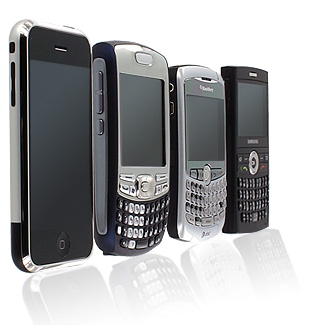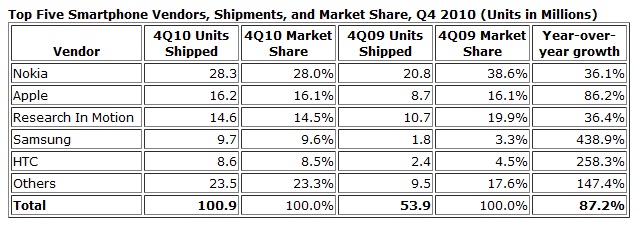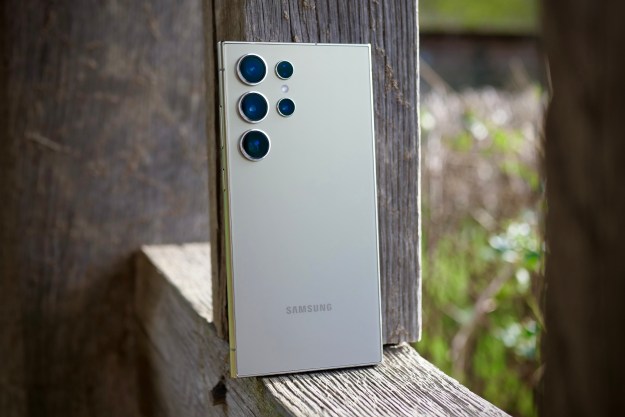 According to research firm International Data Corporation (IDC), smartphones outsold PCs in the fourth quarter of 2010. This marks the first time that smartphones have ever outsold computers. Both devices saw increased sales in this year’s quarter over 2009, but smartphones’ experienced a massive increase and PCs, a very slight jump.
According to research firm International Data Corporation (IDC), smartphones outsold PCs in the fourth quarter of 2010. This marks the first time that smartphones have ever outsold computers. Both devices saw increased sales in this year’s quarter over 2009, but smartphones’ experienced a massive increase and PCs, a very slight jump.
IDC reports that smartphone vendors shipped 100.9 million devices this last fourth quarters, which is an 87.2 percent increase over Q4 2009. PCs increased shipments slightly by 5.5 percent. Analysts claim the poor PC performance is due to competing computing devices as well as consumers being more “cautious” about purchasing computers. Regardless of the traditional PC’s performance, the smartphone numbers don’t appear to be a fluke. Senior research analyst with IDC Kevin Restivo claims there will be various factors to keep consumers buying new smartphones. “Mobile phone users will find compelling reasons to turn in their older models as new ones are launched with dual-core processors and near-field communication chips.”
We already know that Android phones have turned out some remarkable numbers this year, and IDC’s research only supports this. Android’s impressive growth has acted as a catalyst for the smartphone market, senior research analyst Ramon Llamas says. “It has become the cornerstone of multiple vendors’ smartphone strategies, and has quickly become a challenger to market leader Symbian.” Despite Symbian’s ties with Nokia, Android’s expanding relationships with various vendors and manufacturers (such as HTC, LG, Motorola, and Samsung) are challenging other brands.
Nokia, Apple, RIM, Samsung, and HTC were the smartphone. But that’s somewhat misleading: Nokia can largely thank its older devices for its shipment numbers, and still hasn’t found favor with the North American demographic (see the cancelled X7). The iPhone gained with the worldwide market and is also improving its reputation with the corporate world. RIM, more or less, stood its ground, with the real victors appearing to be Samsung and HTC. Both companies vastly improved their market performance, which Samsung can likely attribute to its Galaxy S series and HTC to its increased brand awareness.
So what’s in store for the future of smartphones? The study reasons that more affordable mid-range and low-end smartphones will be marketed to reach a wider audience, and that prices are going to drop on high-end models as well. All good news for consumers, who might end up grabbing smartphones for lower prices despite earlier projections.

Editors' Recommendations
- 5 phones you should buy instead of the iPhone 15 Pro Max
- 5 phones you should buy instead of the iPhone 15 Pro
- How to find downloaded files on an iPhone or Android phone
- Samsung Galaxy S24 Ultra vs. iPhone 15 Pro Max: Which one is best?
- The OnePlus 12 has one big advantage over Samsung and Apple


